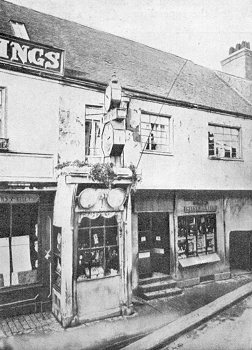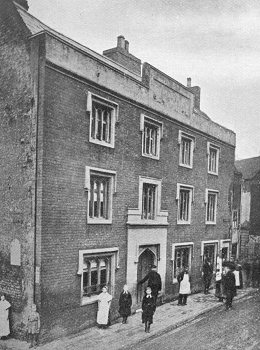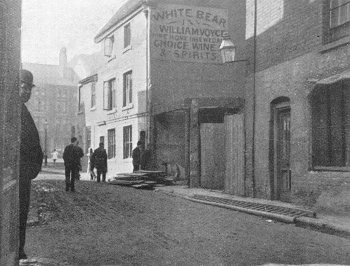Lichfield Street and
Berry Street Old Shop, Lichfield Street This was lost to the town when property was pulled down for laying out the present Lichfield Street. It was once the Court House or Police Office of the town. The porch was originally open, and fitted with stone seats; the parlour walls and ceiling were panelled with oak. In still earlier times, it is said to have been a nunnery (or other religious house) belonging to the Collegiate Church, and connected with the latter by a subterranean passage. A curious legend is attached to a cross formed among the tiles of the old roof. Cromwell, so the story runs, not loving such institutions, was found in pursuit of its inmates; and one of the monks, hard pressed, escaping over the roof, dropped in the hurry his cross; hence, a permanent impression of it. It is still maintained by old inhabitants that snow, no matter how heavy the fall, was never known to settle upon this sign of the cross. When the premises were demolished the quaintly-carved entrance porch was removed to the Rectory garden, Waterloo Road, where it can still be seen.
The old gentleman is still alive, and hopes to celebrate his 95th birthday next July. Mr. and Mrs. Summerland now occupy business premises in Victoria Street. The most notable public-house in old Lichfield Street some 80 years ago was the "Noah's Ark." Although some what degenerated during the latter years of its existence, it was at the beginning of the last century largely frequented by the steady-going farmers and country people from the neighbouring villages attending the Wednesday and Saturday markets, whilst such men as old Richard Fryer, the banker; Samuel Child and Richard Smith, the attorneys; Randle Walker, the builder; and one or two other members of the trading and professional community of the town, regularly patronised the cosy bar parlour, and quaffed the nut-brown ale from silver tankards, on which were inscribed their respective names. It was over the stabling of this ancient hostelry, in the Fold yard at the back, that the first plain brick building, used as a meeting house by the early converts to Methodism in this neighbourhood, was erected in 1795, four years after John Wesley's death. The old Noah's Ark Chapel continued to be used until the erection of a more commodious structure in Darlington Street, in 1824, which has in turn given place to the present handsome edifice. The Old Bluecoat School, Berry Street This charity was founded in 1700 in Berry Street, and in 1832 the school was re-built, as shown in our illustration.
The usefulness of the institution is very much crippled for want of friends, and doubtless the hon. treasurer, Alderman C. T. Mander, would heartily welcome additional subscriptions. Applications for admission are received on the first Friday in each month. The Cock Inn and White Bear, Berry Street Like other old Wolverhampton thoroughfares, Berry Street has seen considerable alterations, needless to say of a beneficial character. The two principal inns were "The White Bear" and "The Cock Inn."
One day in the year 1745, a traveller of military appearance arrived at the house, and deposited in charge of the landlord a good-sized oak chest, bound round with iron clasps. Months, and then years passed away and the box remained in the storeroom unclaimed and forgotten, until one day it was brought to light on the room being cleared. Out of curiosity Mr. Fryer had the lid of the box forced open, and his astonishment may be imagined on finding that it was filled with French gold and silver money. The supposition is that the specie had been forwarded from France for the assistance of the Pretender, Charles Edward, but that owing to his retreat to Scotland, the chest and its contents had been left behind. |






